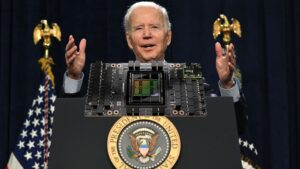Introduction:
In a monumental move for the semiconductor industry, GlobalFoundries (GF) has secured a significant investment of $1.5 billion from the U.S. Department of Commerce, marking a pivotal moment for American chip manufacturing. This funding, part of the U.S. CHIPS and Science Act, underscores the government’s commitment to strengthening domestic semiconductor production, bolstering national security, and enhancing economic competitiveness.
GF, headquartered in New York and celebrating its 15th year of operations, stands as the sole U.S.-based pure play foundry with a global manufacturing footprint. With facilities spanning across the U.S., Europe, and Singapore, GF is positioned uniquely to leverage this investment to expand its capabilities and meet the growing demand for essential chips in critical sectors such as automotive, IoT, aerospace, and defense.
“GF is proud to announce this proposed funding from the Department of Commerce and New York State and appreciates the collaboration of the CHIPS Office and the Empire State Development Corporation throughout this process. These proposed investments, along with the investment tax credit (ITC) for semiconductor manufacturing, are central to the next chapter of Global Foundries story and our industry. They will also play an important role in making the U.S. semiconductor ecosystem more globally competitive and resilient and cements the New York Capital Region as a global semiconductor hub,” said Dr. Thomas Caulfield, president and CEO of GF. “With new onshore capacity and technology on the horizon, as an industry we now need to turn our attention to increasing the demand for U.S.-made chips, and to growing our talented U.S. semiconductor workforce.”
Follow us on Linkedin for everything around Semiconductors & AI
What is US Chips act?
The US Chips Act, officially called the “Chips and Science Act of 2022”, is a major piece of legislation designed to boost domestic semiconductor (chip) manufacturing, research, and design in the United States.
Here’s a breakdown of the act:
Key aims:
- Strengthen American supply chain resilience: Reduce reliance on foreign chip production and address vulnerabilities.
- Counter China: Maintain technological leadership and compete with China’s ambitions in the semiconductor industry.
- Boost the economy and national security: Support high-tech jobs, innovation, and technological independence.
Key provisions:
- $52.7 billion in total funding:
- $39 billion in subsidies for building new chip manufacturing plants in the US.
- $13 billion for semiconductor research and workforce training.
- 25% investment tax credit for chip manufacturing equipment costs.
- $174 billion in additional funding for science and technology research:
- Supports NASA, the Department of Energy, and other research agencies.
- Restrictions on overseas manufacturing:
- Recipients of US funding cannot expand chip manufacturing in China or other countries deemed national security threats.
Current status:
- Signed into law in August 2022.
- Implementation is ongoing, with the Department of Commerce awarding the first grants in February 2024.
- The act’s long-term impact is still unfolding.
Overall, the US Chips Act is a significant investment in the future of the American semiconductor industry. Its success will be measured by its ability to achieve its stated goals of fostering innovation, creating jobs, and ensuring the US remains a leader in chip technology.
Read More: GlobalFoundries Opens $4 Billion Semiconductor Plant in Singapore
3 Aspect of the GlobalFoundries Chips act Funding
1. Expansion of GF’s Malta, NY, Facility:
GF will integrate critical technologies from its facilities in Singapore and Germany to bolster its Malta campus. This expansion aims to cater to the surging demand for semiconductor chips in the automotive industry as vehicles increasingly rely on electronic systems. By diversifying its flagship Malta fab into new technologies and end markets, GF ensures supply chain resilience and meets the evolving needs of its customers, including General Motors.
2. Construction of a New State-of-the-Art Fab:
A new fab will be constructed on the Malta campus to address the growing demand for U.S.-made essential chips across various sectors such as automotive, aerospace, defense, and AI. Leveraging existing infrastructure and ecosystem, this facility will contribute to the rapid scaling of production capacity. With the semiconductor market expected to double over the next decade, GF’s new fab is poised to capture a significant share of this growth, positioning itself as a leader in feature-rich mature, essential chip manufacturing.
Read More: GlobalFoundries Threatens to File Complaint Against TSMC German Subsidies
3. Modernization of GF’s Vermont Facility:
The investment will facilitate the modernization of GF’s facility in Essex Junction, Vermont, enhancing its capacity and enabling high-volume manufacturing of next-generation gallium nitride (GaN) semiconductors. These advanced semiconductors find applications in electric vehicles, power grids, data centers, and emerging technologies like 5G and 6G smartphones. By upgrading its Vermont facility, GF reinforces its commitment to innovation and supports the development of critical technologies essential for future industries.
“Semiconductors are in everything from our cellphones, to refrigerators, to cars, and our most advanced weapons systems, and access to them carries important economic and national security implications. It was the shortages of semiconductors during the COVID-19 pandemic that raised prices for consumers and led to the shutdown of automobile manufacturing sites across the country,” said Secretary of Commerce Gina Raimondo. “Thanks to the CHIPS and Science Act, we’re working to onshore these critical technologies in order to bolster the supply of domestic chips that are essential to manufacturing cars, electronics, and national defense systems in New York, Vermont, and states across the country.”
Job Creation with GlobalFoundries Chips act Funding:
These projects, supported by additional funding from the New York State Green CHIPS initiative and other state benefits, are expected to create over 1,500 manufacturing jobs and approximately 9,000 construction jobs over their lifecycle. Furthermore, GF plans to invest over $12 billion in its U.S. sites over the next decade, cementing its position as a key player in the semiconductor industry and driving economic growth.
Read More: How India Could Become a Global Leader with Tower $8 Billion Semiconductor Fab Proposal
Implications of GlobalFoundries Chips act funding:
The significance of this investment extends beyond economic implications. It represents a strategic move to strengthen America’s semiconductor ecosystem, reduce dependence on foreign suppliers, and enhance national security. With semiconductor chips powering essential devices ranging from smartphones to defense systems, ensuring a robust domestic supply chain is imperative for sustaining technological innovation and maintaining global competitiveness.
Read more: Singapore has ‘very high’ Potential to be Global AI hub: Google
Conclusion:
$1.5 billion investment in GlobalFoundries heralds a new era of semiconductor manufacturing in the United States.




